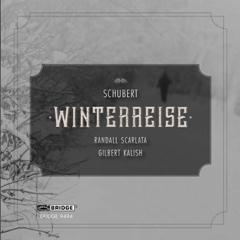Franz Schubert - Winterreise (2017)
Franz Schubert - Winterreise (2017)

1. Good Night (Gute Nacht) 05:39 2. The Weathervane (Die Wetterfahne) 01:41 3. Frozen Tears (Gefrorne Tränen) 02:33 4. Frozen (Erstarrung) 02:48 5. The Linden Tree (Der Lindenbaum) 04:46 6. Flood (Wasserflut) 04:27 7. On the Stream (Auf dem Flusse) 03:36 8. Backwards Glance (Rückblick) 02:17 9. Will o' the Wisp (Irrlicht) 02:49 10. Rest (Rast) 03:13 11. Dreams of Spring (Frühlingstraum) 03:44 12. Loneliness (Einsamkeit) 02:52 13. The Post (Die Post) 02:12 14. The Gray Head (Der greise Kopf) 03:05 15. The Crow (Die Krähe) 01:53 16. Last Hope (Letzte Hoffnung) 02:04 17. In the Village (Im Dorfe) 02:50 18. The Stormy Morning (Der stürmische Morgen) 00:50 19. Deception (Täuschung) 01:29 20. The Signpost (Der Wegweiser) 04:10 21. The Inn (Das Wirtshaus) 04:22 22. Have Courage! (Mut!) 01:23 23. The Sun Dogs (Die Nebensonnen) 02:51 24. The Hurdy-Gurdy Man (Der Leiermann) 03:39 Randall Scarlata - baritone Gilbert Kalish - piano
"Schubert's music is as naive as the poet's expressions; the emotions contained in the poems are as deeply reflected in his own feelings, and these are so brought out in sound that no-one can sing or hear them without being touched to the heart." Thus read a Viennese critic's review of Winterreise, a true masterpiece published in the final year of the composer's life. Enthralled by the verse of Wilhelm Müller (1794-1827), Schubert slightly changed the order of the poems so as to make a story - of a wanderer, a homeless man, unrequited in love and disappointed by the whole word. A tale that has always prompted questions as to what degree it reflects the personal experiences of the two artists, the poet and the musician, coevals whose lives ended too soon. The motif of a vagrant, an outcast loner, was characteristic of 19th-century Romanticism, yet it seems to resonate with the feeling of solitude of those living today. ---supraphon.com
The U.S. is hardly a bastion of art song, but baritone Randall Scarlata has made a career of it there, and has hardly had to leave his native Philadelphia area to do it. The shadows that hang over any singer who tackles Schubert's Die Winterreise, D. 911, are long and deep ones, but Scarlata succeeds in making the work his own on this release on suburban New York's Bridge Records label. Part of the appeal for many buyers will be the presence of veteran pianist Gilbert Kalish, showing that 83 is the new 53 and seemingly not having lost a step. He's a key component in the performance, for Scarlata's conception of the work involves a good deal of rhythmic freedom, and hence a deep level of cooperation with the pianist. Kalish sets off the introductions clearly from the vocal entrances, and Scarlata varies both tempo and dynamics heavily. In a song like Auf dem Flusse, the explosion of passion reflecting the torrent running under the frozen river surface takes on a almost operatic dimension, which is all to the good. In one like the famed Der Lindenbaum, where Scarlata and Kalish give each stanza its own emotional flavor, the results are intriguing but can be questioned: Schubert in this cycle seems to set a kind of folkishness against the darker psychological themes, and in a simple stanzaic structure like that of Der Lindenbaum, something may be lost; sample it to decide for yourself. Scarlata has a warm, attractive tone in his mid-range and breaks nicely into a falsetto-like sound at the top, although he does not have great power there. In general, to come up with a fresh reading of Die Winterreise is hard work, and Scarlata and Kalish have done it. This album was nominated for a Grammy award in 2018 for Best Classical Vocal Performance. ---James Manheim, AllMusic Review
download (mp3 @320 kbs):
